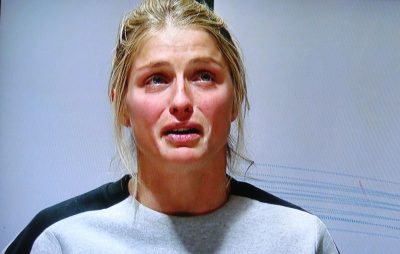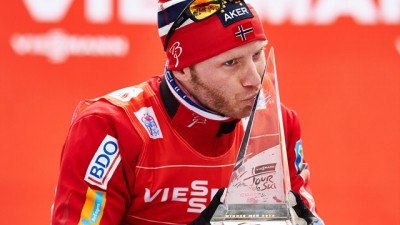NEWS ANALYSIS: As news broke Monday that skiing star Therese Johaug had herself overlooked a clear doping warning on a package of lip salve, it’s not just Norway’s skiers who are suffering a sharp loss of credibility. The country’s entire sports bureaucracy is under fire, for all kinds of reasons, with commentators claiming that those involved are suffering from self-importance and sheer arrogance.

The drama around champion skier Johaug, who tested positive for steroids after using a banned cream to treat sunburned lips, has not let up since she sobbed her way through a press conference late last week that was painful to watch. She’s been the subject of both criticism and sympathy, the latter because she relied on the national ski team doctor’s assurance that the Trofodermin salve was safe to use on her lips, and because Johaug is the country’s crown princess of skiing. She’s pretty and popular and fondly remembered for when she flatly ignored royal protocol and impulsively threw herself into the arms of a laughing King Harald after winning in the World Championships at Holmenkollen in Oslo. She went on to win more gold medals, at the World Cup, the Olympics and the Tour de Ski, and it simply broke many Norwegians’ hearts to see their unstoppable skiing star so miserable, distraught, and crying inconsolably live on national TV.
In seclusion
Since then she’s gone into seclusion, communicating through her attorney and national skiing federation officials. She was not suspended, pending results of an investigation by Norway’s anti-doping agency, and that has sparked international criticism as well. She changed her own mind twice about whether to take part in the women’s ski team’s high-elevation training session back in Italy this week, opting in the end to stay home and work out on her own. Her attorney Christian Hjort told reporters over the weekend that the 28-year-old from a small town in Østerdalen needed peace and quiet.
Anders Solheim, leader of Antidoping Norge, told newspaper Aftenposten on Sunday that Johaug has not been suspended because the preliminary handling of her case has not been concluded. Unlike some of his colleages at the World Anti-Doping Agency (WADA), Solheim doesn’t agree that athletes testing positive must be suspended immediately: “This is a test conducted by Antidoping Norge. Therefore it’s Antidoping Norge that is responsible for following up the test.” If they do determine that Johaug broke the rules, at least she won’t have to leave her teammates in Val Senales and fly home early.
On Monday, Norway’s TV2 reported that Johaug had been given both the tube of banned salve and the box it came in, which was clearly marked with a doping warning. That means Johaug herself overlooked it, raising the chances that she’ll be viewed as negligent. Athletes are ultimately responsible themselves for what medicines they use.
Reputation suffering, also from asthma conflicts
Newspapers like Aftenposten are editorializing that Johaug must not receive any special treatment. The cold, hard facts are that both her A- and B-tests were positive. Keenly aware that international media outlets are following the Johaug case closely, Norwegian media are already claiming that Norway’s sports reputation has suffered badly from both Johaug’s and fellow skiing champion Martin Johnsrud Sundby’s doping cases. “It’s critical that the rules now be followed exactly, to preserve the remains of credibility that can be found in Norwegian cross-country skiing,” Aftenposten wrote on Saturday. At this point, commentators wrote, “the credibility that Norwegian skiing has had throughout the decades has been destroyed in the space of three months.”
That’s a painful admission to make, and just six months after Norway ended another victorious season as the world’s best skiing nation. Norwegian skiers have so dominated the winners’ podium that the only earlier concerns have been over whether other countries would lose interest in the sport, simply because it was so hard to beat the Norwegians.

In addition to the Sundby and Johaug doping cases, such a far cry from when they both won the overall World Cup just two years ago, Norway’s skiing establishment is also under fire for having given asthma medicine even to athletes (including Johaug) who don’t have asthma. That controversy is under investigation. Now the medical team around the skiers is being blasted again, over slack routines. The doctor who gave Johaug the banned salve has resigned, but it’s been reported that in Sweden, for example, at least two doctors must be involved in giving any medicine to any athlete. In Norway, that hasn’t been necessary. Other countries claim they would never buy medicine at pharmacies abroad, as Johaug’s team doctor did in Italy late last summer. Newspaper Dagens Næringsliv (DN) reported that even though Norway’s skiing federation has spent as much as NOK 8 million on its ski waxing team, it has spent just a fourth of that on its medical team and doesn’t even have a full-time permanent doctor.
Some support
As the tears ran also in Johaug’s hometown of Dalsbygda, she’s had some supporters. A former Norwegian prime minister, Thorbjørn Jagland, who now heads the Council of Europe, was among those coming to Johaug’s defense. He was unhappy with the media coverage of her doping case that he saw on Norwegian websites, in France and elsewhere, and claims that athletes also have a right to prove their innocence before being branded as guilty. Professor Justin Hallén of Norway’s sports college (Idrettshøyskole) thinks media coverage has been much too critical, too, and that there’s a big difference between the kind of systematic doping carried out by cyclist Lance Armstrong and doping that resulted from use of a salve to treat lip sores that contained a mild steroid that does not enhance performance. He’s afraid Johaug has already been branded negatively for life.
So is she and Sundby, both of whom insist they’re innocent of any willful wrongdoing. The mess they’re in, however, prompted sports commentator Ola Bernhus in Oslo newspaper Aftenposten to write that both are “paying the price for Norwegian arrogance.”
Not just skiing is in trouble
That alleged arrogance arguably extends beyond skiing circles, given recent football scandals and, not least, a controversy raging in Norway over top sports bureaucrats’ refusal to release their expense accounts for public review. Sports is largely funded with taxpayers’ money in Norway, and the government minister in charge of allocating it has complained that since she must release all her travel and other expenses for public review, so should the sports officials.

They have so far refused, citing a vote taken at the most recent national convention of all the branches of athletics in Norway. Tom Tvedt, president of the national athletics foundation, was recently grilled live on national TV by NRK anchor Ingerid Stenvold (a former sports reporter herself). The athletics federation’s so-called “openness commission” had earlier that week delivered a report calling for “more openness in the future.”
There was no sign, though, that Tvedt and the other bureaucrats would reveal what they spent, for example, at the Sochi Olympics or at a host of other sports events up to 2015. Stenvold kept asking Tvedt why they wouldn’t reveal their expenses, and Tvedt kept squirming and avoided answering. Stenvold wondered whether that didn’t simply feed suspicions the sports officials “have something to hide.” Tvedt denied they did, but again, wouldn’t answer.
Public reaction was swift and severe, praising Stenvold and NRK for trying to make Tvedt accountable and bashing Tvedt and many of the other “ageing white men” who, as sports bosses, have hung on to so much power for so long. Tvedt later admitted he hadn’t responded well and he apologized for being “unclear and imprecise.” He said he could understand that the NRK interview “created an impression that we have something to hide. We don’t.” But he still wouldn’t take the initiative to release personal expense accounts of the sports officials.
‘Reputation destroyed’
That, coming not long after a noisy and failed attempt to spend billions on an Olympics in Oslo, has not boosted credibility in sports leaders. A month before the Johaug doping case emerged, another top atheletics boss, Tore Øvrebø, told Aftenposten he could understand that Norway’s reputation in the sports world had taken a hit because of the asthma medicine controversy. Individual athletes said the same. “I can understand that folks are doubting us,” skier Eirik Brandsdal told Aftenposten in early September.
Now those doubts have skyrocketed, both nationally and internationally. “Norway’s reputation as a clean nation is destroyed,” declared the medical of Antidoping Finland, Timo Seppälä, as early as August. Commercial sponsors are raising questions. “There is a lot of room for improvement,” said John G Bernander, the NRK boss who headed the openness commission.
Perhaps a Member of Parliament, Ib Thomsen of the Progress Party, summed it up best: “You don’t have to be Swedish any longer to see that Norwegian athletics is beginning to have a problem with its reputation,” Thomsen wrote in newspaper Dagsavisen recently, and that was also before the Johaug scandal.
Crisis year
Johaug will, at the very least, have to live with suspicion this winter even if she’s allowed to compete when the season starts just six weeks from now. She faces suspension for as long as four years, and many predict she’ll be banned from the sport for at least a few months.
It’s been a crisis year for nearly all Norwegian sports, also in terms of poor results in sports outside skiing, like football and Norway’s dismal performance at the Summer Olympics in Rio de Janeiro. Not even Norway’s top cyclists are doing well, and two of them descended into quarreling at the World Championships in Qatar this weekend.
“It’s natural to ask whether we have control,” said Torbjørn Skogstad, head of the cross-country skiing committee of the national ski federation, at Johaug’s tearful press conference. As Skogstad and his colleagues continue to have meetings and “go over all our routines,” his boss, federaton president Erik Røste, has been caught in scandal once again. Now neither he nor his fellow sports officials may retain control over their own futures in the sports bureaucracy either.
newsinenglish.no/Nina Berglund

